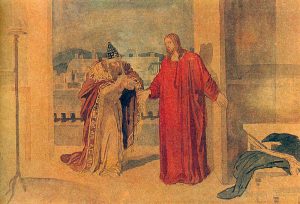Illuminations on the Lectionary readings for March 5, 2023 (Lent 2A)
First Reading: Genesis 12:1-4a
We began Lent last week by pondering readings about temptation, sin, and repentance. This week our thoughts turn to faith: our deep conviction that God waits with us when we make decisions that shape our lives.

Christ and Nicodemus (c.1850), watercolor by Aleksandr Andreevich Ivanov (1806-1858). The State Tretyakov Gallery, Moscow. (Click image to enlarge)
In our first reading, we meet Abram, whom God will later rename Abraham. Even at the advanced age of 75, Abram’s faith gave him the strength to risk of following God’s call to uproot his family and begin the people’s long journey from his home in Ur (in present-day Iraq) toward the promised land. In response to Abram’s faith and trust, God will bless him and his family; and through him, God will bless all the families of the Earth.
Psalm: Psalm 121
When I served as a hospital chaplain, I kept a bookmark set on Psalm 121. Its verses, I found, brought comfort and peace to many as they faced whatever crisis had brought them for urgent care. We lift up our eyes to the hills seeking help, the Psalmist sings; and that help comes from God watching over us and protecting us. As Paul will observe in the second reading, God’s help is not meted out to reward us for our faith or for anything else we do. God watches over our going out and our coming in because that is who God is, and that is what God does.
Second Reading: Romans 4:1-5, 13-17
Paul recalls the foundational story of Abraham in this passage from his pastoral letter to the church in Rome. His theological reflection seems consistent with Psalm 121: God’s promise of eternal life comes to us, as it came to Abraham, not in reward for anything that we have done to deserve it, but entirely through our faith by grace. Seeking in this letter to restore Rome’s Jewish Christians and pagan converts to unity, he reminds them that God’s promise depends on faith, not something due to us, but a gift. It was given to all the nations, not to Abraham’s descendants alone.
Gospel: John 3:1-17
Nicodemus, a Pharisee who came to see Jesus in the dark of night, couldn’t figure how a grown person could creep back into the mother’s body to be “born again.” But Jesus saw no contradiction between being born of the flesh as an infant and being “born again,” or, as it can also be translated, “born from above,” not in the flesh but through faith and the Spirit. Then we hear the familiar words of John 3:16: “For God so loved the world that he gave his only Son, so that everyone who believes in him may not perish but may have eternal life.” Does this mean that only Christians can be saved? Jesus’s teaching surely rules that out. The next verse makes clear that Jesus did not come to condemn the world, but to save the world and all its nations.
